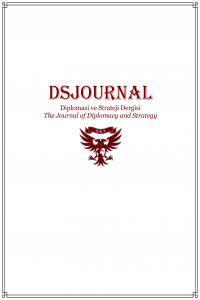Çin'in Yumuşak Güç Diplomasisini Güçlendirmek
This work is an extension of Policy recommendations on strengthening China’s soft power. Although many scholars both Western (International) and Chinese (National) have immensely highlighted soft power diplomacy in several dimensions. This paper argues that China has strong soft power resources, but does not have an effective international media presence to sell its story. Moreover, China lacks a global presence yet as McDonald’s, KFC, dollars, and Hollywood have a strong Economy, Culture, and History. Therefore, I propose in this paper that China can enhance its soft power by fast-food chains with Chinese characteristics that I give the name of Chi-Fast and Chinese Film productions with the collaboration of Chinese Film Stars working with other regions in general and BRI countries in specific. By producing Film and video games with Chinese Characteristics (I would name it Chi-Film) and adding other languages and cultures of the regions would appeal a large number of people nonetheless, along with a strong foothold of Chinese Media globally and specifically presence in BRI countries.
Anahtar Kelimeler:
Çin, Yumuşak Güç, BRI, Chi-Fast, Chi-Film
To Fortify China’s Soft Power Diplomacy
This work is an extension of Policy recommendations on strengthening China’s soft power. Although many scholars both Western (International) and Chinese (National) have immensely highlighted soft power diplomacy in several dimensions. This paper argues that China has strong soft power resources, but does not have an effective international media presence to sell its story. Moreover, China lacks a global presence yet as McDonald’s, KFC, dollars, and Hollywood have a strong Economy, Culture, and History. Therefore, I propose in this paper that China can enhance its soft power by fast-food chains with Chinese characteristics that I give the name of Chi-Fast and Chinese Film productions with the collaboration of Chinese Film Stars working with other regions in general and BRI countries in specific. By producing Film and video games with Chinese Characteristics (I would name it Chi-Film) and adding other languages and cultures of the regions would appeal a large number of people nonetheless, along with a strong foothold of Chinese Media globally and specifically presence in BRI countries.
Keywords:
Soft power, China, BRI, Chi-Fast, Chi-Film,
___
- China Daily. 2014. China to promote cultural soft power, https://www.chinadaily.com.cn/china/2014-01/01/content_17208354, accessed 24 March 2021.
- Hua, M.H. (2007). China Soft Power Evaluation Report, China Academic Journal, International Observation No. 2. 中国软实力评估报告,China Academic Journal, 国际 观察 2007年第 2期
- Jintao, H. 2007. “Hold High the Great Banner of Socialism with Chinese Characteristics and Strive for New Victories in Building a Moderately Prosperous Society in All”, Report to the 17th Party Congress, 15 October 2007, http://www.china.org.cn/english/congress/229611.htm, accessed 1 March 2021.
- Jiangyun, H. 2012. “China’s Soft Power: Room for Improvement”, China Academic Journal Electronic Publishing House, China Daily.
- Li,X. & Worm,V. 2010. “Building China’s Soft Power for a Peaceful Rise”, Journal of Chinese Political Science/Association of Chinese Political Studies, p.69. doi: 10.1007/s11366-010-9130-2.
- Mingwei, Z. 2012. http://www.china.com.cn/v/18da/201211/09/content_27060351, http://www.china.com.cn/news/zhuanti/lundun/201203/27/content_25036318.htm, http://news.china.com.cn/201506/11/content_35795349.htm accessed 20 Apr. 2021.
- Minxin, P. (2004). "Soft Power" Is Also the Basis of a Powerful Country, People's Daily Online, “软实力”也是强国之本, 裴敏欣, 人民网—“软实力”也是强国之本, 2004年 04月16日
- Nye, J.S. 1990. “Foreign Policy”. 80, Twentieth Anniversary, pp. 153-171. https://doi.org/10.2307/1148580 accessed 20 April 2021.
- Tuo, C. 2010. “Reflections on the International Orientation of Contemporary China”, China Academic Journal,当代中国国际定位的若干思考.
- Wilson Center Reports, 2020 “Scholars and Media on China’s culture soft power”, China and the Wilson Quarterly, http://www.wilsoncenter.org/ accessed 25 March 2021.
- Xuetong,Y. 2007. “The Core of Soft Power is Political Power”, https://news.xinhuanet.com/world/2007 05/23/content_6139900.htm, accessed 20 March 2021软实力的核心是政治实力, 软实力的核心是政治实力.
- Xueliang, D. (2016). 郑永年:中国为什么没建立起自己的知识体系? 改革前瞻 共识网—在大变革时代寻找共识, 中国的智库:智枯和智源 FT中文网.
- Yongnian, Z. (2016).Why didn't China establish its own knowledge system? Looking for consensus in an era of great change, China's think tank: Zhikuo and Zhiyuan FT Chinese. 郑永年:中国为什么没建立起自己的知识体系?郑永年:中国为什么没 建立起自己的知识体系? 改革前瞻 共识网—在大变革时代寻找共识.
- Zhangrun, X. 2016.http://www.ftchinese.com/story/001066321?full=y&archive, accessed 20 Apr. 2021.
- Zhongying, P. (2014). China's Diplomacy, "Huairou" Is More Reliable Than Soft Power. Comment Global. 庞中英:中国外交,2014,“怀柔”比软实力更靠谱, 庞中 英:中国外交,“怀柔”比软实力更靠谱_评论_环球网
- Başlangıç: 2020
- Yayıncı: Diplomasi ve Strateji Çalışmaları Derneği
